外研版(2019)高中英语必修第一册 Unit 6 At one with nature Using language 名师课件(36张)
文档属性
| 名称 | 外研版(2019)高中英语必修第一册 Unit 6 At one with nature Using language 名师课件(36张) | 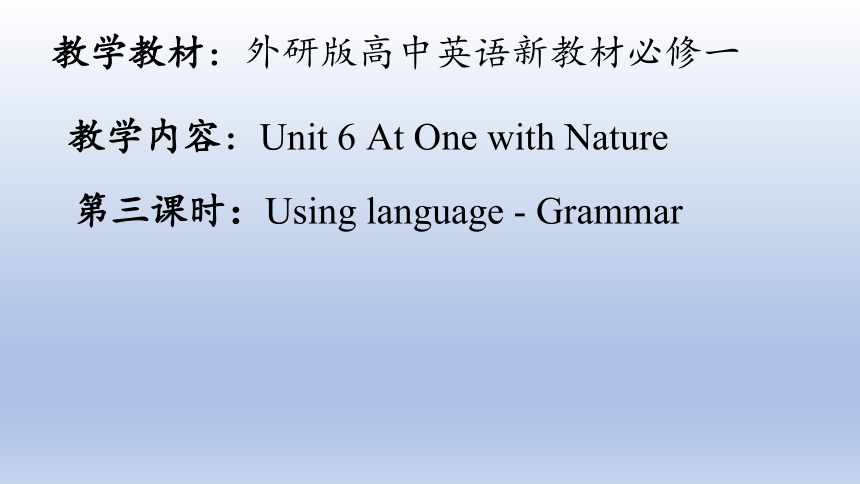 | |
| 格式 | pptx | ||
| 文件大小 | 9.1MB | ||
| 资源类型 | 教案 | ||
| 版本资源 | 外研版(2019) | ||
| 科目 | 英语 | ||
| 更新时间 | 2023-02-26 13:49:49 | ||
图片预览

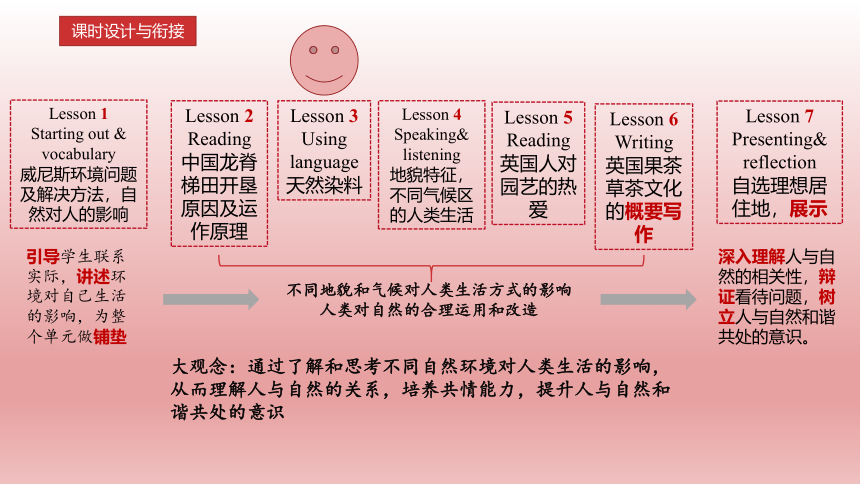
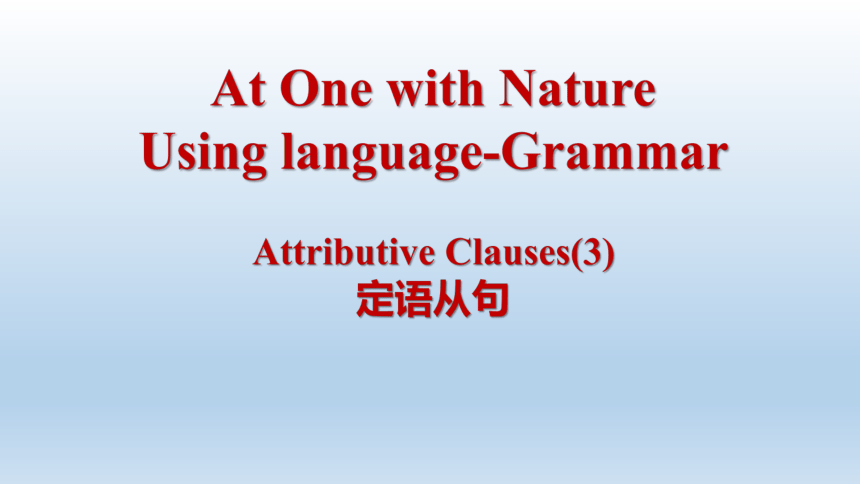

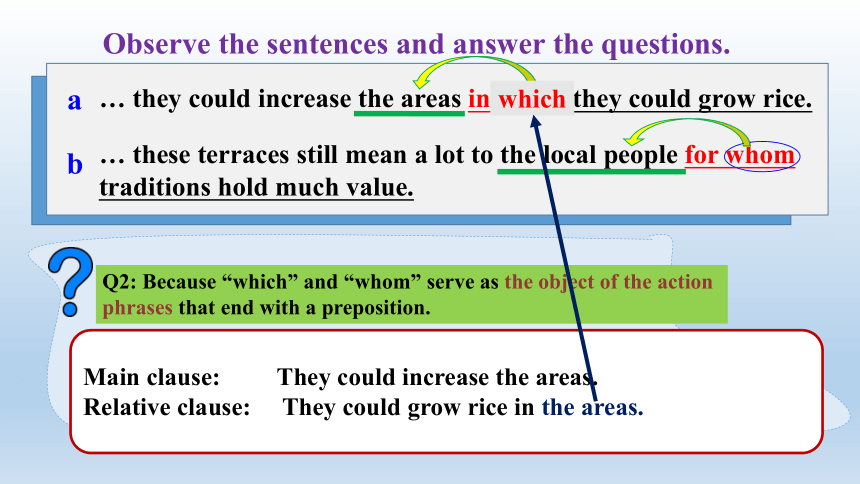
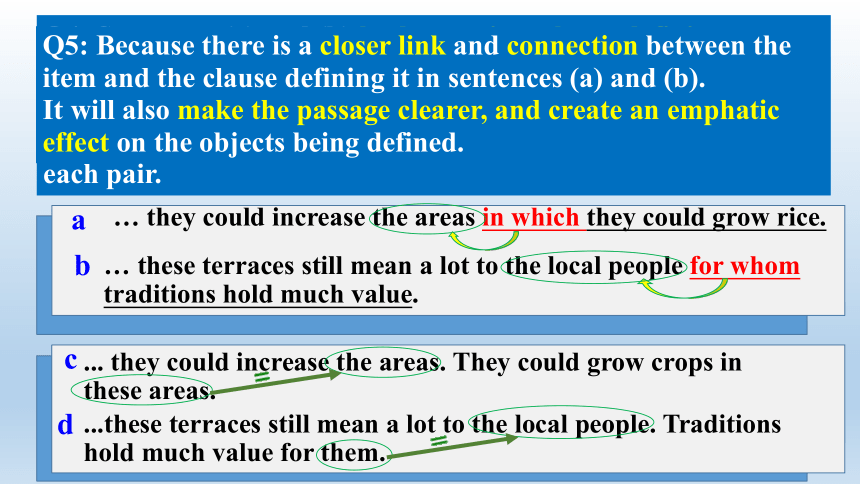
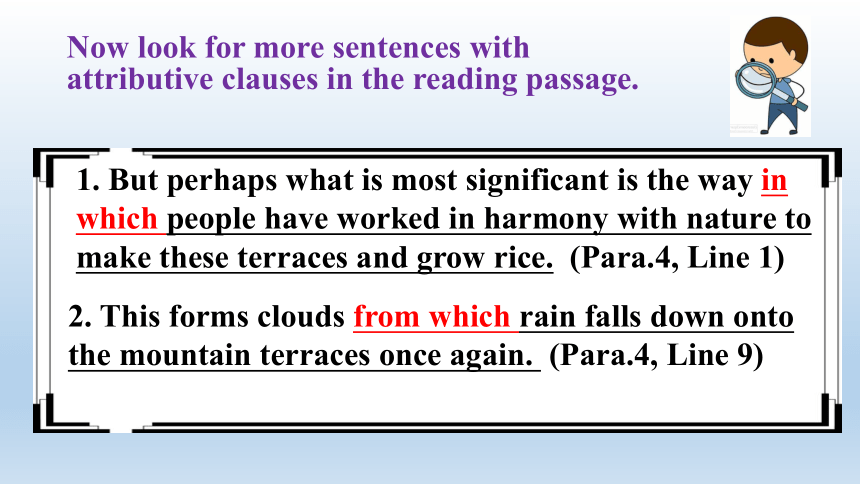
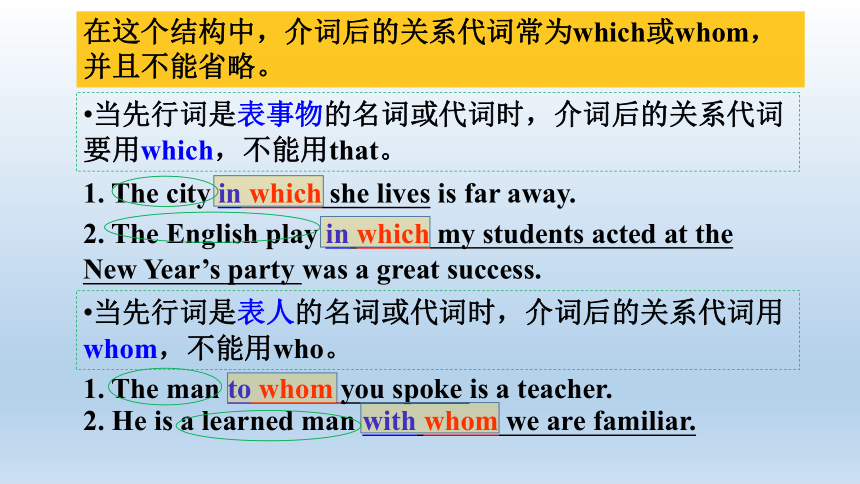
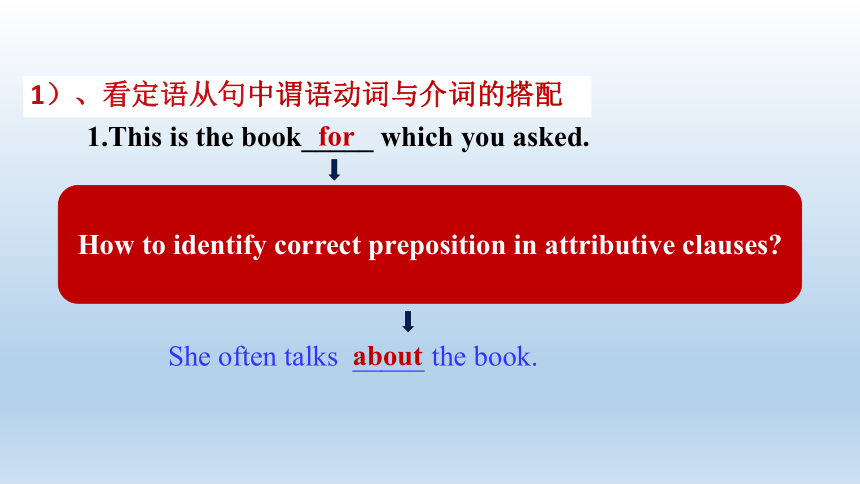
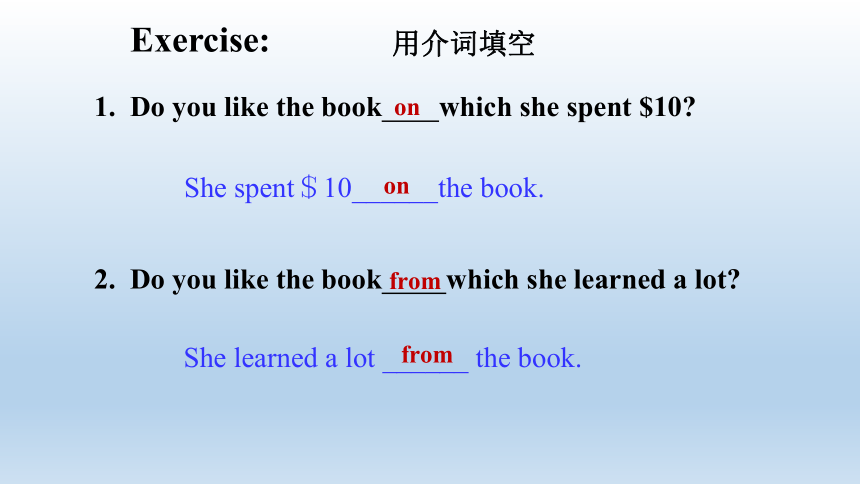
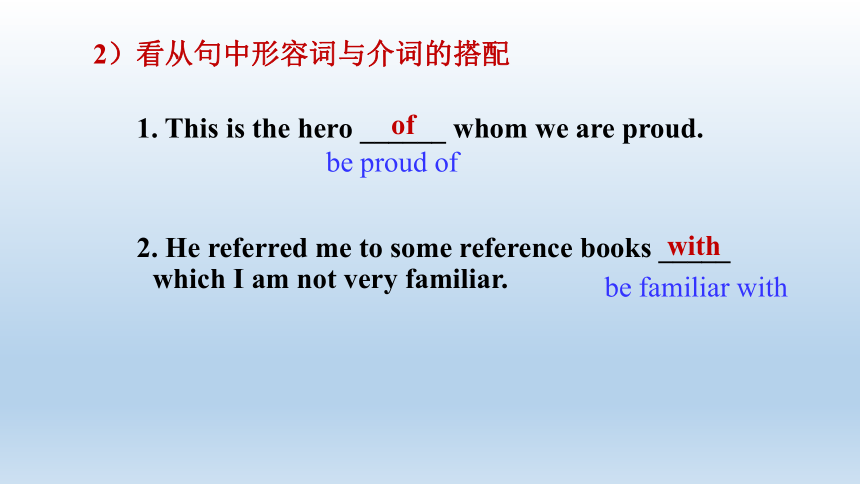
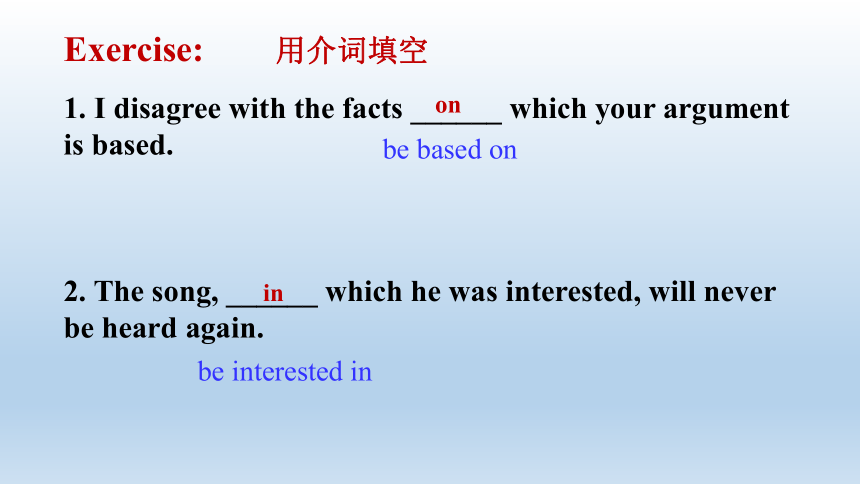
文档简介
(共31张PPT)
教学教材:外研版高中英语新教材必修一
教学内容:Unit 6 At One with Nature
第三课时:Using language - Grammar
Lesson 1
Starting out & vocabulary
威尼斯环境问题及解决方法,自然对人的影响
Lesson 2
Reading
中国龙脊梯田开垦原因及运作原理
Lesson 3
Using language
天然染料
Lesson 4
Speaking& listening
地貌特征,不同气候区的人类生活
Lesson 5
Reading
英国人对园艺的热爱
Lesson 6
Writing
英国果茶草茶文化的概要写作
Lesson 7
Presenting& reflection
自选理想居住地,展示
课时设计与衔接
深入理解人与自然的相关性,辩证看待问题,树立人与自然和谐共处的意识。
大观念:通过了解和思考不同自然环境对人类生活的影响,从而理解人与自然的关系,培养共情能力,提升人与自然和谐共处的意识
不同地貌和气候对人类生活方式的影响
人类对自然的合理运用和改造
引导学生联系实际,讲述环境对自己生活的影响,为整个单元做铺垫
At One with Nature
Using language-Grammar
Attributive Clauses(3)
定语从句
Longji Rice Terraces
Review
Main idea
… they could increase the areas in which they could grow rice.
… these terraces still mean a lot to the local people for whom traditions hold much value.
a
b
Observe the sentences and answer the questions.
Q1. What do “which” and “whom” refer to in
each sentence
Q2. Why do we use prepositions before “which” and “whom”
Q3. In sentence (a), can we replace “in which”
with “where” without changing the meaning
Q2: Because “which” and “whom” serve as the object of the action phrases that end with a preposition.
Q3: Yes.
Main clause: They could increase the areas.
Relative clause: They could grow rice in the areas.
which
… they could increase the areas in which they could grow rice.
… these terraces still mean a lot to the local people for whom traditions hold much value.
a
b
... they could increase the areas. They could grow crops in these areas.
...these terraces still mean a lot to the local people. Traditions hold much value for them.
c
d
Compare and answer the questions.
4. What is the difference between the two groups of sentences
5. Why does the author choose to use sentences (a) and (b) in the reading passage
Q4: Sentences (a) and (b) both contain a clause defining a noun in the sentence.
Sentence (c) and (d) are constructed with a pair of simple sentences, with one defining a noun in the other sentence in each pair.
Q5: Because there is a closer link and connection between the item and the clause defining it in sentences (a) and (b).
It will also make the passage clearer, and create an emphatic effect on the objects being defined.
Now look for more sentences with attributive clauses in the reading passage.
2. This forms clouds from which rain falls down onto the mountain terraces once again. (Para.4, Line 9)
1. But perhaps what is most significant is the way in which people have worked in harmony with nature to make these terraces and grow rice. (Para.4, Line 1)
1. The man to whom you spoke is a teacher.
2. He is a learned man with whom we are familiar.
当先行词是表人的名词或代词时,介词后的关系代词用whom,不能用who。
1. The city in which she lives is far away.
2. The English play in which my students acted at the New Year’s party was a great success.
当先行词是表事物的名词或代词时,介词后的关系代词要用which,不能用that。
在这个结构中,介词后的关系代词常为which或whom,并且不能省略。
1.This is the book_____ which you asked.
for
You asked _____ the book.
2. Do you like the book which she often talks
about
She often talks _____ the book.
for
about
1)、看定语从句中谓语动词与介词的搭配
How to identify correct preposition in attributive clauses
1. Do you like the book which she spent $10
2. Do you like the book which she learned a lot
on
from
用介词填空
She spent$10______the book.
She learned a lot ______ the book.
from
on
Exercise:
1. This is the hero ______ whom we are proud.
2. He referred me to some reference books _____ which I am not very familiar.
be familiar with
2)看从句中形容词与介词的搭配
with
of
be proud of
Exercise: 用介词填空
1. I disagree with the facts ______ which your argument is based.
2. The song, ______ which he was interested, will never be heard again.
on
in
be based on
be interested in
3) 根据先行词判断
1. Can you tell me the office _____ which he works
2. We saw a big table ___ which there were many books.
He works ____ the office.
There were many books____ a big table.
in
in
on
on
Review of Unit 5
where
where
观察下列定语从句:
1. I’ll never forget the day when I joined the league.
2. This is the house where I lived two years ago.
3. Do you know the reason why she was late.
when = ______ which
on
where =______ which
in
why = ______ which
for
= I’ll never forget the day on which I joined the league.
=This is the house in which I lived two years ago.
=Do you know the reason for which she was late.
Guessing: “when”、 “ where” 和 “ why”
都可以替换成“介词 + which”
They’ll never forget July 1. Hong Kong returned to its motherland on July 1.
They’ll never forget July 1 when Hong Kong returned to its motherland.
The days are gone forever. We used foreign oil during those days.
The days when we used foreign oil are gone forever.
关系副词when
Relative adverb: when
when引导的定语从句修饰表示时间的名词,并在定语从句中作时间状语,相当于“介词+关系代词(which)”。
I’ll never forget the day when I joined the league.
on which =(on the day)
=
Relative adverb: when
We still remembered the days when we travelled together.
The time _____ I first met Nelson Mandela was a very difficult period of my life.
when
in which (=in the days)
=
Relative adverb: when
This is the factory. I worked in the factory ten years ago.
This is the factory where I worked ten years ago.
The school is near a park. My son studies in this school.
The school where my son studies is near a park.
关系副词where
Relative adverb: where
where引导的定语从句修饰表示地点的名词,并在定语从句中作地点状语,相当于“介词+关系代词(which)”。
This is the house where I lived two years ago.
in which (=in the house)
=
Relative adverb: where
Relative adverb: why
why只用于reason之后的限制性定语从句中,在定语从句中作原因状语。
Is it the reason he refused our help
I don't want to hear any reason you are absent(缺席).
why
why
why = for which
Review of Unit 5
=I don't want to hear any reason for which you are absent.
why只用于reason之后的限制性定语从句中,在定语从句中作原因状语。
This is the reason he gave his teacher in the classroom.
The reason he did not go to school is that he was ill.
which/that
why
This is the reason.
He gave his teacher the reason in the classroom.
why = for which
Relative adverb: why
分解
做宾语
做原因状语
=The reason for which he did not go to school is that he was ill.
why引导的定语从句修饰表示原因的名词,并在定语从句中作原因状语,相当于“介词(for)+关系代词(which)”。
Summary
关系副词: where, when, why都可以替换成“介词 + which”
时间 when = in / at / on / during which
地点 where = at/in/on which
原因 why = for which
“when” means “at that time”,
“where” means “at that place”,
“why” is used after the word “reason”.
Conclusion: “when”、 “ where” 和 “ why”
都可以替换成“介词 + which”
I met the child (whom) I looked after ten years ago.
我遇到了十年前我照料过的那个孩子。
This is the book (that/which) you are looking for.
这是你正在找的书。
含有介词的动词固定短语在定语从句中一般不拆开,在这种情况下,介词仍然放在后面,如 hear from,look after, look for等。而在介词处于句尾时,句中的关系代词可以省略。
Summary
如何判断介词?
1)看定语从句中谓语动词与介词的搭配
2)看定语从句中形容词与介词的搭配
3)根据先行词判断
Connect the sentences with a preposition + whom/which.
2
1. The Zhuang is an ethnic group.
Its population is the largest of all ethnic groups in China.
2. Guangxi is a province. The Longji Rice Terraces are located in it.
The Zhuang is an ethnic group of which the population is the largest of all ethnic groups in China.
Guangxi is a province in which the Longji Rice Terraces are located.
Exercise
P65 2
3. I want to visit this cultural landscape. The title of UNESCO World Heritage Site was given to it in 2016.
4. He is an expert on rice planting. The local Zhuang people have learnt a lot from him.
I want to visit this cultural landscape to which the title of UNESCO World Heritage Site was given in 2016.
He is an expert on rice planting from whom the local Zhuang people have learnt a lot.
P65 2
Complete the passage with a preposition +whom/which.
3
from which
in which
for which
for whom
P65 3
“介词+关系代词”引导的定语从句
介词的确定:
1. 由主从句的句意决定;
2. 由从句动词、形容词等构成的固定短语确定;
3.根据先行词确定所需介词。
结构:
介词+which(指物)/介词+whom(指人)
Homework
Complete the sentences with preposition+ whom or preposition+ which.
Wind power is an ancient source of energy________we may return in the near future.
2. Gun control is a subject ___________Americans have argued for a long time.
3. He was educated at a local grammar school, __________ he went on to Cambridge.
4. There are species living in the depths of the oceans ________ we still know little.
5. Today's English learners have a wide choice of dictionaries __________to choose.
6. A good advertisement often uses words _________ people attach positive meanings.
7. The position, however, __________ you are applying, is not quite a well-paid one.
8. In the end, it was Becky _________ he turned for a gentle word and a smile.
9. American women usually identify their best friend as someone ________ they can talk frequently.
10.In our class there are 46 students, _______ half wear glasses.
Homework
THANK YOU
教学教材:外研版高中英语新教材必修一
教学内容:Unit 6 At One with Nature
第三课时:Using language - Grammar
Lesson 1
Starting out & vocabulary
威尼斯环境问题及解决方法,自然对人的影响
Lesson 2
Reading
中国龙脊梯田开垦原因及运作原理
Lesson 3
Using language
天然染料
Lesson 4
Speaking& listening
地貌特征,不同气候区的人类生活
Lesson 5
Reading
英国人对园艺的热爱
Lesson 6
Writing
英国果茶草茶文化的概要写作
Lesson 7
Presenting& reflection
自选理想居住地,展示
课时设计与衔接
深入理解人与自然的相关性,辩证看待问题,树立人与自然和谐共处的意识。
大观念:通过了解和思考不同自然环境对人类生活的影响,从而理解人与自然的关系,培养共情能力,提升人与自然和谐共处的意识
不同地貌和气候对人类生活方式的影响
人类对自然的合理运用和改造
引导学生联系实际,讲述环境对自己生活的影响,为整个单元做铺垫
At One with Nature
Using language-Grammar
Attributive Clauses(3)
定语从句
Longji Rice Terraces
Review
Main idea
… they could increase the areas in which they could grow rice.
… these terraces still mean a lot to the local people for whom traditions hold much value.
a
b
Observe the sentences and answer the questions.
Q1. What do “which” and “whom” refer to in
each sentence
Q2. Why do we use prepositions before “which” and “whom”
Q3. In sentence (a), can we replace “in which”
with “where” without changing the meaning
Q2: Because “which” and “whom” serve as the object of the action phrases that end with a preposition.
Q3: Yes.
Main clause: They could increase the areas.
Relative clause: They could grow rice in the areas.
which
… they could increase the areas in which they could grow rice.
… these terraces still mean a lot to the local people for whom traditions hold much value.
a
b
... they could increase the areas. They could grow crops in these areas.
...these terraces still mean a lot to the local people. Traditions hold much value for them.
c
d
Compare and answer the questions.
4. What is the difference between the two groups of sentences
5. Why does the author choose to use sentences (a) and (b) in the reading passage
Q4: Sentences (a) and (b) both contain a clause defining a noun in the sentence.
Sentence (c) and (d) are constructed with a pair of simple sentences, with one defining a noun in the other sentence in each pair.
Q5: Because there is a closer link and connection between the item and the clause defining it in sentences (a) and (b).
It will also make the passage clearer, and create an emphatic effect on the objects being defined.
Now look for more sentences with attributive clauses in the reading passage.
2. This forms clouds from which rain falls down onto the mountain terraces once again. (Para.4, Line 9)
1. But perhaps what is most significant is the way in which people have worked in harmony with nature to make these terraces and grow rice. (Para.4, Line 1)
1. The man to whom you spoke is a teacher.
2. He is a learned man with whom we are familiar.
当先行词是表人的名词或代词时,介词后的关系代词用whom,不能用who。
1. The city in which she lives is far away.
2. The English play in which my students acted at the New Year’s party was a great success.
当先行词是表事物的名词或代词时,介词后的关系代词要用which,不能用that。
在这个结构中,介词后的关系代词常为which或whom,并且不能省略。
1.This is the book_____ which you asked.
for
You asked _____ the book.
2. Do you like the book which she often talks
about
She often talks _____ the book.
for
about
1)、看定语从句中谓语动词与介词的搭配
How to identify correct preposition in attributive clauses
1. Do you like the book which she spent $10
2. Do you like the book which she learned a lot
on
from
用介词填空
She spent$10______the book.
She learned a lot ______ the book.
from
on
Exercise:
1. This is the hero ______ whom we are proud.
2. He referred me to some reference books _____ which I am not very familiar.
be familiar with
2)看从句中形容词与介词的搭配
with
of
be proud of
Exercise: 用介词填空
1. I disagree with the facts ______ which your argument is based.
2. The song, ______ which he was interested, will never be heard again.
on
in
be based on
be interested in
3) 根据先行词判断
1. Can you tell me the office _____ which he works
2. We saw a big table ___ which there were many books.
He works ____ the office.
There were many books____ a big table.
in
in
on
on
Review of Unit 5
where
where
观察下列定语从句:
1. I’ll never forget the day when I joined the league.
2. This is the house where I lived two years ago.
3. Do you know the reason why she was late.
when = ______ which
on
where =______ which
in
why = ______ which
for
= I’ll never forget the day on which I joined the league.
=This is the house in which I lived two years ago.
=Do you know the reason for which she was late.
Guessing: “when”、 “ where” 和 “ why”
都可以替换成“介词 + which”
They’ll never forget July 1. Hong Kong returned to its motherland on July 1.
They’ll never forget July 1 when Hong Kong returned to its motherland.
The days are gone forever. We used foreign oil during those days.
The days when we used foreign oil are gone forever.
关系副词when
Relative adverb: when
when引导的定语从句修饰表示时间的名词,并在定语从句中作时间状语,相当于“介词+关系代词(which)”。
I’ll never forget the day when I joined the league.
on which =(on the day)
=
Relative adverb: when
We still remembered the days when we travelled together.
The time _____ I first met Nelson Mandela was a very difficult period of my life.
when
in which (=in the days)
=
Relative adverb: when
This is the factory. I worked in the factory ten years ago.
This is the factory where I worked ten years ago.
The school is near a park. My son studies in this school.
The school where my son studies is near a park.
关系副词where
Relative adverb: where
where引导的定语从句修饰表示地点的名词,并在定语从句中作地点状语,相当于“介词+关系代词(which)”。
This is the house where I lived two years ago.
in which (=in the house)
=
Relative adverb: where
Relative adverb: why
why只用于reason之后的限制性定语从句中,在定语从句中作原因状语。
Is it the reason he refused our help
I don't want to hear any reason you are absent(缺席).
why
why
why = for which
Review of Unit 5
=I don't want to hear any reason for which you are absent.
why只用于reason之后的限制性定语从句中,在定语从句中作原因状语。
This is the reason he gave his teacher in the classroom.
The reason he did not go to school is that he was ill.
which/that
why
This is the reason.
He gave his teacher the reason in the classroom.
why = for which
Relative adverb: why
分解
做宾语
做原因状语
=The reason for which he did not go to school is that he was ill.
why引导的定语从句修饰表示原因的名词,并在定语从句中作原因状语,相当于“介词(for)+关系代词(which)”。
Summary
关系副词: where, when, why都可以替换成“介词 + which”
时间 when = in / at / on / during which
地点 where = at/in/on which
原因 why = for which
“when” means “at that time”,
“where” means “at that place”,
“why” is used after the word “reason”.
Conclusion: “when”、 “ where” 和 “ why”
都可以替换成“介词 + which”
I met the child (whom) I looked after ten years ago.
我遇到了十年前我照料过的那个孩子。
This is the book (that/which) you are looking for.
这是你正在找的书。
含有介词的动词固定短语在定语从句中一般不拆开,在这种情况下,介词仍然放在后面,如 hear from,look after, look for等。而在介词处于句尾时,句中的关系代词可以省略。
Summary
如何判断介词?
1)看定语从句中谓语动词与介词的搭配
2)看定语从句中形容词与介词的搭配
3)根据先行词判断
Connect the sentences with a preposition + whom/which.
2
1. The Zhuang is an ethnic group.
Its population is the largest of all ethnic groups in China.
2. Guangxi is a province. The Longji Rice Terraces are located in it.
The Zhuang is an ethnic group of which the population is the largest of all ethnic groups in China.
Guangxi is a province in which the Longji Rice Terraces are located.
Exercise
P65 2
3. I want to visit this cultural landscape. The title of UNESCO World Heritage Site was given to it in 2016.
4. He is an expert on rice planting. The local Zhuang people have learnt a lot from him.
I want to visit this cultural landscape to which the title of UNESCO World Heritage Site was given in 2016.
He is an expert on rice planting from whom the local Zhuang people have learnt a lot.
P65 2
Complete the passage with a preposition +whom/which.
3
from which
in which
for which
for whom
P65 3
“介词+关系代词”引导的定语从句
介词的确定:
1. 由主从句的句意决定;
2. 由从句动词、形容词等构成的固定短语确定;
3.根据先行词确定所需介词。
结构:
介词+which(指物)/介词+whom(指人)
Homework
Complete the sentences with preposition+ whom or preposition+ which.
Wind power is an ancient source of energy________we may return in the near future.
2. Gun control is a subject ___________Americans have argued for a long time.
3. He was educated at a local grammar school, __________ he went on to Cambridge.
4. There are species living in the depths of the oceans ________ we still know little.
5. Today's English learners have a wide choice of dictionaries __________to choose.
6. A good advertisement often uses words _________ people attach positive meanings.
7. The position, however, __________ you are applying, is not quite a well-paid one.
8. In the end, it was Becky _________ he turned for a gentle word and a smile.
9. American women usually identify their best friend as someone ________ they can talk frequently.
10.In our class there are 46 students, _______ half wear glasses.
Homework
THANK YOU
